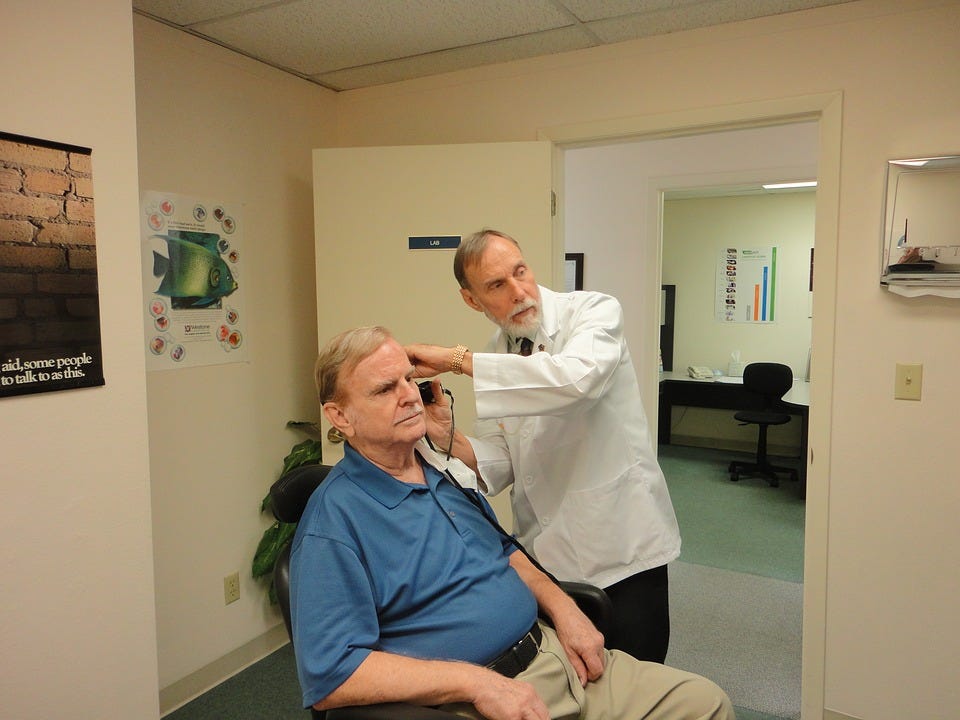Biden vs The Deep State: Hearing Aid Edition
Why is the FDA refusing to allow competition in the hearing aid market? Habit, probably.
Welcome to BIG, a newsletter on the politics of monopoly power. If you’d like to sign up to receive issues over email, you can do so here.
One of the scams in American medicine is hearing aids, which can cost up to $5-10k apiece. That is an insane price, for what is essentially an adjustable microphone. There are roughly 40 million Americans with some form of hearing loss, which can lead to dementia, and many of them can’t afford hearing aids because of the ridiculously high price.
There is no reason for these prices except monopoly power. In this case, the monopoly is government-created through a requirement that hearing aids be accompanied by a prescription offered by an audiologist. Audiologists are necessary specialists in many cases of hearing loss, but not all. The requirement that every hearing aid must be a prescription hearing aid redounded to the benefit of audiologists, as well a small cartel of firms who made approved hearing aid devices that cost huge sums of money. (It’s a similar dynamic in glasses and contact lenses, which is why they are so much cheaper in Asia.)
Back in 2017, Elizabeth Warren and a group of Republican Senators passed a bill forcing the Food and Drug Administration to break this monopoly. The bill mandated the FDA allow over the counter hearing aids, which is to say, hearing aids that do not require a prescription and can be adjusted by the individual user. With smartphone technology, over the counter hearing aids have become far more practical, and so such a regulatory change was long overdue. The day the bill passed, shares of the firms that control the hearing aid market took a 10-20% dive, anticipating lots of competition. And sure enough, Bose announced a cheaper hearing aid in 2018.
But the FDA has been dragging its feet, missing the 2020 deadline in the bill to issue guidance for an over the counter hearing aid market. Bose, with special dispensation from the FDA, finally launched its $850 device, but is not allowed to market it as a hearing aid because regulators haven’t created the category yet.
It’s a frustrating situation. There will be lots of competition in this market, and prices will plummet. Indeed, they are plummeting already, but we should be further along by now.
Under Biden, I suspect it won’t be long before the FDA finally overcomes its inertia and acts. That said, the delay reflects a sloth and soft corruption across the U.S. government, where bureaucrats really dislike having to address market power problems because it conflicts with what they prefer doing, which is keeping things the way they are. You can also see this dynamic at the Federal Trade Commission, where the attitude towards critics is either condescension or ‘how dare they we’ve done great.’ But this bureaucratic sloth is everywhere.
Trump encountered it, using the term ‘deep state,’ and fought it loudly and publicly, in ways that were often but not always in bad faith. He still struggled, both because of his own incompetence and because bad habits are deeply baked into our bureaucracies. Biden is encountering bureaucratic inertia as well, and his people are fighting to govern. The fight is not as loud and public as it is with Trump, but it’s just as intense, only below the radar and largely ignored by the political press.



You actually do have an error. Bose is allowed to market their SoundControl hearing aid as a hearing aid because they trailblazed a new class of self-fitting hearing aids through the FDA de novo process.
Every other unregulated, non-monopolized technology has plummeted in price. There is no reason hearing aids shouldn't be free of 'help' from the Feds. Note: we have paid many thousands of $'s under the current regime because if you can afford it, there is no alternative.